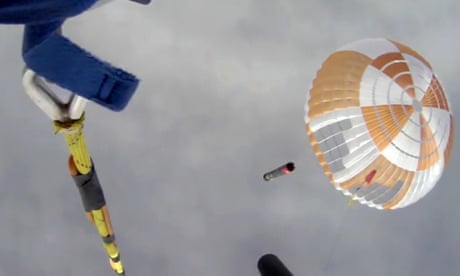- by foxnews
- 08 Apr 2025
‘Supersonic ballet’: helicopter briefly catches falling rocket
‘Supersonic ballet’: helicopter briefly catches falling rocket
- by theguardian
- 05 May 2022
- in technology

A space company has briefly managed to catch a falling rocket using a helicopter and a hook in a test described by its chief executive as "something of a supersonic ballet".
The test was part of Rocket Lab's attempts to find relatively low-cost ways of recovering rockets for multiple missions to space.
After lifting off to send 34 satellites towards orbit at 10.50am local time (2350 BST) in New Zealand, the California-based company's four-storey-tall Electron booster stage fell back through Earth's atmosphere and deployed a series of parachutes to slow its speed.
At high altitudes above the South Pacific, just off the New Zealand coast, a helicopter hanging a long, vertical cable from its underside was steered by two pilots over the booster, which had stretched a capture line at its side as it descended under a parachute at roughly 22mph (35km/h).
The helicopter cable latched on to the booster's capture line, seen on the company's live stream, prompting cheers and applause from Rocket Lab engineers in the company's mission control centre in Long Beach.
But the cheers turned to groans as the helicopter pilots were forced to release the rocket from the cable and drop it into the Pacific Ocean after noticing "different load characteristics" than had been experienced during previous capture tests, a Rocket Lab spokesperson later said.
Peter Beck, the founder and chief executive of Rocket Lab, said: "Bringing a rocket back from space and catching it with a helicopter is something of a supersonic ballet. A tremendous number of factors have to align and many systems have to work together flawlessly, so I am incredibly proud of the stellar efforts of our recovery team and all of our engineers who made this mission and our first catch a success."
The rocket stage made a controlled splash down in the ocean after its brief capture. Onboard systems oriented the rocket to minimise damage from its impact with the water. It was then loaded on to a recovery vessel.
Its condition will be assessed and a decision made as to whether to refurbish it for another flight. Reusing rocket stages significantly lowers the cost of reaching orbit. Catching them before they splash down removes the risk of damage from saltwater and the impact.
The team will also review the brief capture to understand what happened and determine if changes are needed before the next midair helicopter attempt. Another Electron launch is scheduled for later this month.
Reuters contributed to this report
- by foxnews
- descember 09, 2016
Ancient settlement reveals remains of 1,800-year-old dog, baffling experts: 'Preserved quite well'
Archaeologists have recently unearthed the remarkably well-preserved remains of a dog from ancient Rome, shedding light on the widespread practice of ritual sacrifice in antiquity.
read more





